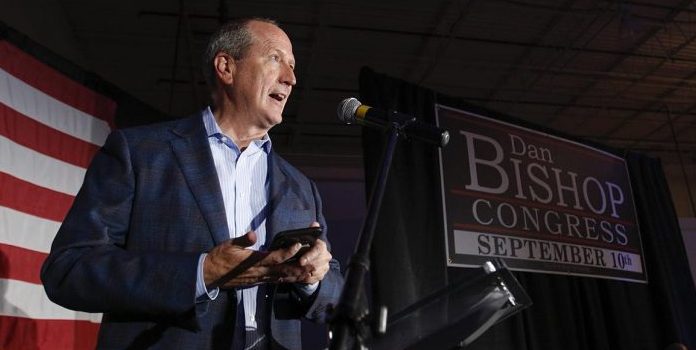(Ken Silva, Headline USA) When House lawmakers announced last January the creation of a committee to investigate the weaponization of federal government, Rep. Dan Bishop, R-N.C., said the public could expect something akin to the “Church Committee”—a 1970s-era panel that uncovered illegal FBI surveillance, secret CIA drug experiments and numerous other instances of malfeasance.
“With the rules agreement we negotiated, we will have a powerful Church-style committee to go after the weaponization of the federal government — the FBI, DOJ, DHS, and all the rest,” Rep. Bishop, who negotiated for the committee’s creation, said at the time.
More than a year later, the Weaponization Subcommittee has yielded some positive results—perhaps most notably in the censorship area, where the committee found that the government is pressuring social media companies to suppress politically inconvenient information. The subcommittee has also investigated issues such as the FBI retaliating against whistleblowers, targeting traditionalist Catholics, collecting Jan. 6 protestors’ bank records, and more.
But for those who’ve been harmed by the weaponized federal government—including journalists who documented the events of Jan. 6, 2021; and the families ensnared in the dubious Whitmer kidnap conspiracy case—the Weaponization Subcommittee has left a lot to be desired.
Really hoping that changes.
— Julie Kelly 🇺🇸 (@julie_kelly2) October 15, 2023
In an interview with Headline USA, Rep. Bishop said he agrees with the critics: It’s time for the Weaponization Subcommittee to do more, especially when it comes to issues such as Jan. 6 and the Whitmer kidnap plot.
“I think there’s a good bit more potential in the Weaponization Subcommittee I negotiated for than what has been made of it. I don’t know what Chairman [Jim] Jordan will use the remainder of the Congress to get into, but suffice it to say there a lot of stones unturned,” he said.
Bishop did caution that the subcommittee is limited in the information it can force federal agencies to provide.
Indeed, GOP lawmakers have been accused of interfering in DOJ investigations in their attempts to probe prosecutorial decisions into Donald Trump. And even though a case such as the FBI’s Whitmer kidnap conspiracy is now closed, Bishop said he expects stiff resistance from the FBI if Congress tried to obtain records from that matter.
“I think if we subpoenaed records, I wouldn’t be surprised to see the FBI resist, even though the case is closed. But certainly, that ought to be looked into,” Bishop said of the Whitmer case.
Asserting congressional oversight of the Jan. 6 cases could be even more difficult, given that the DOJ’s work on those matters is still ongoing.
Bishop said one J6-related area GOP lawmakers should be pursing more aggressively is holding their predecessors accountable for destroying records. Bishop was referring to the fact that more that 1 terabyte of data is missing from the Democrat-controlled Jan. 6 Committee’s politicized investigation.
“Bennie Thompson and his folks saw fit to ‘deep-six’ some of that evidence, and I think that should be investigated thoroughly,” Bishop said.
“Matt Gaetz and I walked into the place where those records are stored early on, and saw there was a Relativity database [a litigation management tool that digitizes court documents and other records]. They had about 1 million documents uploaded into the system, which were offloaded to a contractor but weren’t available. We should be able to recover that info,” he said.
Bishop said he’ll “keep swinging the baseball bat as hard as I can” as he serves his final year in Congress.
But the ineffectiveness of Congress is one of the reasons Bishop said he’s running to be the next attorney general of North Carolina. Headline USA plans to publish an article Tuesday with more details on Bishop’s plans as North Carolina’s top cop.
Ken Silva is a staff writer at Headline USA. Follow him at twitter.com/jd_cashless.

